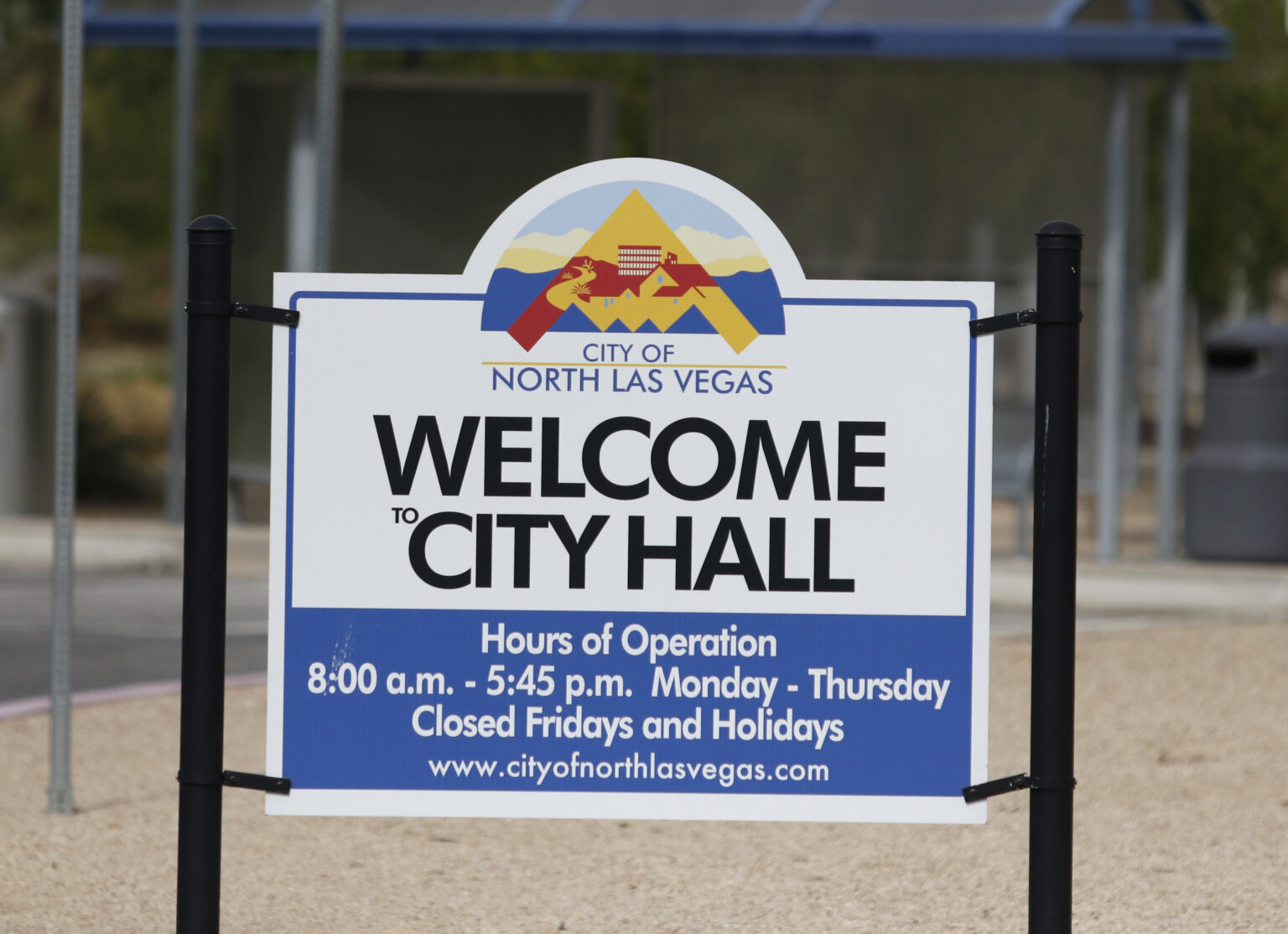6:03
News Story
NLV mayor, state senator spar over sinking homes
Lawmakers want answers on recent purchases in Windsor Park

A North Las Vegas spokeswoman says the city, which has prohibited Windsor Park homeowners from building walls or adding on to their homes since 1991, has taken no action to notify prospective buyers of the neighborhood’s subsidence or the city-imposed limitations. (Photo: Ronda Churchill/Nevada Current)
When Gary and Cinthia Arnett bought their North Las Vegas home in 2020, they had no idea the ground beneath their Windsor Park neighborhood was literally shifting beneath their feet, and had been for decades. They didn’t know that in the last 30 years about half the Windsor Park houses had been condemned or purchased by the city. Or that owners who spent decades paying off mortgages took the city up on relocation when their walls began to crumble, and got $50,000 for their trouble.
The Arnetts paid $200,000 for their home.
“My mom and dad got a VA loan in October 2020, and in January of 2021, my father passed away,” says their daughter, Kimberly Lairmore, who told the Current her mom can’t afford to move in today’s market. She says the family heard a variety of stories after they moved in from neighbors about why vacant lots outnumbered houses. None of the stories involved sinking.
The Arnetts are one of dozens of families who have purchased homes in Windsor Park since the city’s concerted effort, aided by $14 million in federal funds to relocate homeowners because of geologic subsidence, began in the 1990s.
“I don’t think the city should have allowed for the home to be sold in the first place. If they knew the condition of the land, why are they continuing to allow the places to be sold?” asks their daughter, who says the family’s real estate agent could not have known of the hazards. “She’s a longtime friend of mine. There’s no way she would have even suggested the area.” \
City spokeswoman Kathleen Richards says NLV, which has prohibited Windsor Park homeowners from building walls or adding on to their homes since 1991, has taken no action to notify prospective buyers of the neighborhood’s subsidence or the city-imposed limitations.
“It’s incumbent on a residential property seller and/or seller’s agent to disclose known conditions to a buyer,” Richards said Wednesday via email. “The City has not recorded anything on the properties.”
Juan Lopez, the real estate agent who represented the seller in the Arnett’s deal, says he was unaware the neighborhood was sinking. “One thing we did notice was there was a lot of distressed properties nearby,” Lopez told the Current Thursday morning, hours before a legislative hearing in Carson City on a bill designed to move Windsor Park residents to new homes in an adjacent area, and arrange to have their existing mortgages paid.
The measure is sponsored by Sen. Dina Neal, who lashed out at longtime NLV council member and current mayor Pamela Goynes-Brown. Neal said she invited Goynes-Brown to the hearing to present the measure, but the mayor responded that she had received the bill’s text too late.
Goynes-Brown, who represented the Windsor Park residents as a councilperson, championed a warehouse development adjacent to the sinking neighborhood, but backed off when neighbors protested. Another warehouse project has since been approved by the city.
“The residents know exactly who you are, how you behave and what you’ve shown them,” Neal said of Goynes-Brown during the hearing.
“Senator Neal has demanded the city rebuild the homes where they are, which was contrary to all scientific studies and stalled and limited the successful efforts using the federal program,” Goynes-Brown said in a statement to the Current following the hearing. “It is great news that she now understands rebuilding a home at Windsor park is not an option, and we hope her change of heart helps our ongoing efforts to encourage the relocation of the remaining residents.”
Neal told the Current she has not demanded the homes be rebuilt. During the hearing she repeatedly accused NLV of “recharacterizing words.”
“Keep playing word games and we’re gonna have a problem because I am not willing to sacrifice another year on this mystical plan that supposedly exists,” Neal said. “You have neglected these families. They are aware of it. It is in evidence. It is proven, and you still want to duck and dodge and recharacterize language.”
The bill seeks $20 million from the city and $10 million from the state to relocate the Windsor Park residents in new homes and pay off their previous mortgage.
Neal chastised NLV for opposing the bill on the grounds of not wanting to use public funds, while pledging tax dollars and seeking state housing funds to purchase the land at the former Texas Station and Fiesta sites.
“You want to come to the table and say I don’t have the $20 million but you have it for what you want,” she said.
History seeped in neglect
“How Windsor Park came about is an evil we probably don’t even want to discuss,” said North Las Vegas official Jared Luke, who blamed the city’s inaction on its insolvency during the Great Recession. “We couldn’t have come to this body five years ago to try and remedy Windsor Park or anything within the city of North Las Vegas in this manner by stripping $20 million out of the general fund or bonding for $20 million… . We would have been laughed out of the building.”
But the city’s financial woes span a brief period in a saga that dates back four decades.
Neal’s proposal enjoys broad support among the longtime residents, who have lost faith in the city’s previous efforts.
Some 45 homeowners who took the city up on relocation more than 20 years ago were promised comparable 6,000 square foot lots, Neal said. “What they got was somewhere around 1,300 square feet,”
Neal noted that in the 1990s, the neighborhood was redlined by U.S. Housing and Urban Development and homeowners lost their insurance as a result of the sinking.
“The residents are in a real predicament because they cannot sell their home or property and HUD has redlined the area not to give loans,” she said, adding the residents, mostly senior citizens, were unequipped to wage battle against the city and had little choice but to stay put, given their distrust of the city. “There’s a narrative running around these 90 families that it’s their fault that they remained in this community.”
Lawmakers want to know why the city hasn’t taken steps to notify new buyers of the land’s condition.
“That’s a very good question,” said Luke of NLV, adding he would check with the city’s attorneys to find out if doing so via notification on title could bring liability on the city.
The city’s finance director, William Harty, testified no residents have taken part in the relocation program in at least eight years. The city has about $2.5 million remaining in money designated to help Windsor Park residents. About a quarter of a million has been used since 2016 for maintenance and to pay property taxes due for neighborhood parcels.
It’s unknown if the city is using the money to pay taxes to itself, or on parcels it owns.
The committee passed Neal’s bill, which will now move to the Assembly.
Our stories may be republished online or in print under Creative Commons license CC BY-NC-ND 4.0. We ask that you edit only for style or to shorten, provide proper attribution and link to our website. AP and Getty images may not be republished. Please see our republishing guidelines for use of any other photos and graphics.



